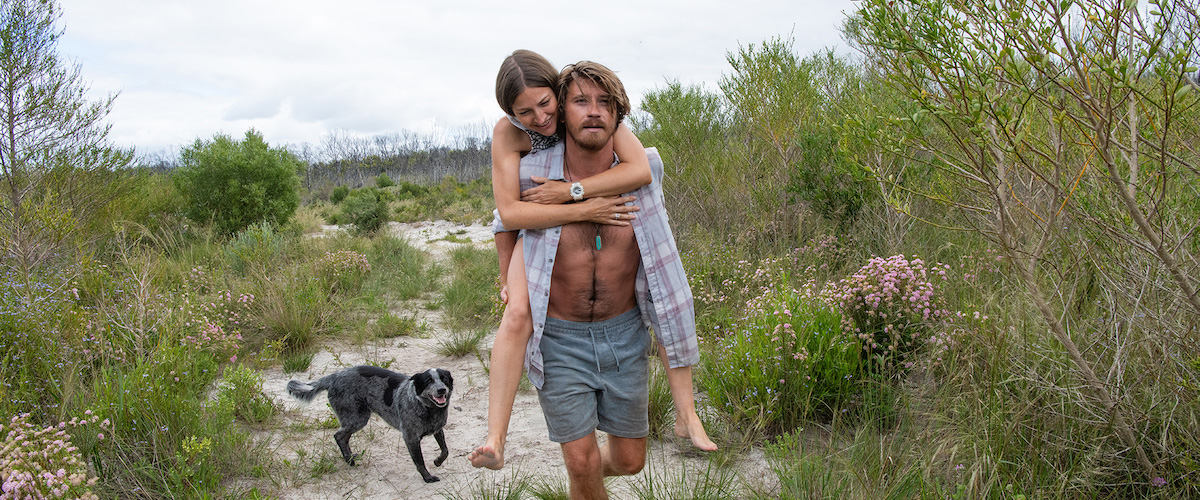As with much of Tim Winton’s output, Dirt Music is a narrative drenched in masculinity. It simmers with whispered thoughts that ricochet around the minds of men who yearn for a vent to release them, all the while they fear and loathe the verbalisation of those thoughts. Internalisation is key, an aspect that makes the written word a distinct beauty as opposed to its cinematic brethren. What is said on page can appear as a steel-faced glare on screen, with all the torrents of turmoil and anguish in a devoutly-male mind that might roar to life in a novel sluicing away into oblivion on screen.
Gregor Jordan’s filmic return to Australia after a sojourn in the US has him eagerly embracing the vast landscape of Western Australia, from the Great Southern to the magnificent Kimberley, and approaching the long-struggling adaptation of Winton’s classic tome. In an alternate timeline, Philip Noyce would have directed Heath Ledger and Rachel Weisz with a script by Justin Monjo (Dark City) and John Collee (Master and Commander). Noyce saw something in Ledger that made him suitable for the lead role, probably the same spark that Jordan saw when he worked with the icon on Two Hands and Ned Kelly, a glimmer of brilliance that neither Colin Farrell, Russell Crowe, nor Chris Hemsworth, managed to reflect, and as such, the project withered away.
The role these varied men were in line to portray was Lou Fox, a music-focused, rural living hunter and fisherman, living in a quagmire of unresolved grief over the loss of his niece, brother, and her mother. Given the emotional weight that Ledger brought to his finest performance in Brokeback Mountain, it’s easy to see why Noyce considered him for this role. Yet, as the world still mourns the tragic loss of Ledger, Garrett Hedlund steps in to fill the role of this weathered Australian man.
Hedlund conjures an admirable Strine accent that suggests his Lou Fox is from the middle of nowhere, centre of somewhere, Australia. He’s a sun-drenched man, worn down by the salt air that has calcified his lungs and has permanently changed his hair. Lou gave himself to the land, relinquishing his soul, body, and mind to it, and has put himself in the passenger seat, waiting for the straight road to hit a curve and claim his existence away.
That curve never comes, but instead, like a siren in the night, Kelly MacDonald’s Georgie is there to alight the fire once again in Lou’s heart. The complexity in Winton’s writing is marginalised by a script that feels the need to elevate the romance of the text, and as such, the front third of Dirt Music is weighted with a stagnant affair that should be more eighties steamy romance than awkward chemistry-free blanket turning. Moving past that first half hour, we’re left with the tangible core of the film that makes Dirt Music an honourable stumble, rather than the out and out mess that it’s been pilloried as.
Lou Fox is the emotional core of Dirt Music, a fact that seems to have eluded writer Jack Thorne (His Dark Materials, Wonder), as he pushes the initial focus on Kelly MacDonald’s perceptibly poorly constructed character, Georgie, and forces Lou’s story through her eyes. Tim Winton has never been one to write great women characters, yet as shown in the landmark anthology film, The Turning, the creative deficiencies that plague Winton’s work can be improved upon by a great writer. A keen writer would fill in the character gaps that Winton’s women are littered with, giving the actress something tangible to work with that isn’t a routine trope.
Elizabeth Debicki pulled as best a performance as she could in Breath, albeit one that lead to her to being a love-lost waif constrained to her bed and being of service to the male characters. Here, MacDonald’s Georgie is an equally routine character that has hints of being a complete person, but Thorne’s script never fully conjures a character that a great actress like Kelly could truly make feel alive. Georgie is a vagrant, a woman looking for a safe place to ground herself, and – possibly opportunistically – she sees that sanctuary in David Wenham’s widower Jim. Yet, the platform in Jim’s family that Georgie wishes to establish for herself never arrives, and as such, she is neither a partner to Jim, nor a tangible mother to his kids, instead becoming an emotional tourist in his life.
Gregor Jordan’s direction initially battles against the romance of the film, but he finds a natural flow when the visual extravagance opens up, finding a freedom in the open air, giving both the characters and audience ample time to breath with the environment and take it all in. Dirt Music is at its best when it allows the landscape and world to reflect the humanity of its characters back at them. For some, the film will have lost them after the awkward opening half hour, but for the patient and forgiving, Dirt Music rewards with a deeply emotional narrative that reconciles with the complexities of the masculine mind.
And frustratingly, MacDonald’s acting transforms Georgie into a heightened nuisance, dishonouring the powerful nuance that comes with someone who is perpetually adrift in the world. For the entirety of Dirt Music, MacDonald delivers a performance that is consistently at odds with the Australian dialect, driven by an accent that is beyond parody, leading to MacDonald consistently sounding like she’s fighting with her own tongue. As such, any emotional resonance that MacDonald feels she’s creating with Georgie is lost in a manner that becomes hard to respond to. Thankfully, the emotional lynchpin is Lou Fox, and Hedlund’s performance more than compensates for the absent soul of Georgie.
The duality of frustration that comes from MacDonald’s performance and Thorne’s script conjures a distinctly un-Australian vibe to aspects of Dirt Music. When non-Australian writers seek to adapt our truly Aussie texts, they often do so by injecting an array of perceived colloquialisms that are supposed to pepper the steak with added flavour and vibrancy, making it taste and feel authentic. Here, Thorne script feels at times like a fifty year old parrot, stuck on phrases they heard from Paul Hogan-wannabes in the eighties. It doesn’t feel right. With that said, when David Wenham and Aaron Pedersen are on screen, that Aussie truth cuts through the ocker-adjacent dialogue and suddenly there’s the feeling of a real Australia at play.
It feels almost old hat and tired to mention once again how Aussie men struggle to talk about their emotions, given how it’s almost becoming a trope in itself in Aussie cultural media, but that’s a core theme of much of Tim Winton’s work, and it’s this aspect of Dirt Music that has been realised with all its tragic glory. Garrett Hedlund holds onto an emotional truth that resonates the pain of loss and trauma loudly and brilliantly. As the plot threads slowly unveil, they do so in a manner that strengthens Lou, and additionally amplifies the pain of David Wenham’s Jim.
As Georgie strolls through Lou’s man cave of a house, cataloguing his belongings and silently critiquing their existence, she notices a bookshelf full of worn tomes about men, written by men. Challenging Lou, she asks him whether he’d considered reading a book written by a woman. His absent response suggests that that notion had never crossed his mind. It’s apt that this film, written and directed by men, based on a book by a man about men, reflects masculinity so well, even as it fails the women in its plot.
It also amplifies the cringe worthy archaic stereotypes of women that should have been adjusted to at least give MacDonald and muso Julia Stone something more to play than opportunistic women who engage in infidelity and affairs. Stone is wonderful as Sal, and thanks to her soulful singing, she comes to life beautifully through flashbacks to Lou’s better days.
With that said, this is a film about men, and – once again, and not excusing its failures – that is where it shines. Hedlund has impressed before, with powerful work in Mudbound showing how great he can be, and while this isn’t a match to that, it at least gives him the fertile ground to explore a characters emotional palette tenderly.
But if there’s one actor that impresses the most, it’s David Wenham. The man is an icon, that’s undeniable, but with Dirt Music, he gives the best performance of his career. His Jim is a man who, after the death of his wife, pushed himself back into work as a skipper of a crayboat. He’s an older figure, one with rusted on beliefs about needing the boat to be quiet and devoid of talk about ones self.
The initial encounter with Jim suggests that he’s a villain, a nefarious foe to the ‘heroes’ of the tale. An immediate battle ignites between his fishing vessel and Lou, who has been stealing crayfish and stock from Jim’s pots, but there is a devout nuance to both stories, with each having an intimate understanding of the others past. Both Hedlund and Wenham flow against each other naturally, their inherent quietness amplifying their own unresolved traumas.
Early on we see Jim complaining to Georgie about a shipmate talking about his problems, with Jim saying ‘why can’t he keep it to himself? Why does he have to talk about it so much?’ It’s pointed that this comes early in the film, with the rest of Dirt Music playing like a well-reasoned response to that frustrating question.
Wenham’s devout understanding of what it means to be a working Australian man shows in empathetic performance that feels true to life. His path has been shaken by loss, and as recognises that no matter how much he persuades it back to normalcy, it just won’t budge. As the climax reveals itself, so does a stunning moment of emotional vulnerability from Jim, with Wenham giving himself completely to the scene and inviting the audience to witness his open state. Wenham’s relief of finally being able untether his grief only hints at the unprocessed anguish he lives with, having actively smothered it with obstinance, avoidance, and a misguided layer of stoicism.
Here, the rural areas of Western Australia are lands driven by men, with the order being dictated by them, and as such, there’s little sense of introspection. They wake, they sail out into the dark morning light to check craypots and they return with a bounty of shellfish. Rinse and repeat. They control the waters and they control the land, manufacturing a routine that accommodates avoidance and a regimental masculine order. Even the women of the land have been masculinised, with their dutiful roles being of service to the men. They stay at home, tending to it and the family that lives there, awaiting the return of their men.
Georgie finds herself in the position of being Jim’s doting partner at home, and struggles to find grounding and stability, instead finding awkwardness in the role of being surrogate mother to his kids. An accident at the wharf has Georgie offering her nurse training as assistance, but is rejected outright as it’s ‘not her place’. Here, women have limited value in the land of men, a critique that is never truly reckoned with.
Dirt Music accentuates the land of lost men with the stunning and breathtaking West Australian landscape. As Lou finds refuge in the vast array of islands that encompass a myriad of archipelagos and hidden coves, he does so knowing that he’s not the first to lose himself there. He encounters opportunistic men, living on pain killers and coffee, scouring the roads for oblivion. He encounters a young Indigenous bloke with an older Indigenous man, both of whom find comfort in the spirit of music. He encounters a man in a shack, watching the ocean for days, waiting for that one storm to carry this mess away.
And yes, naturally, the greatest metaphor of them all, he encounters himself.
The hyper-masculinisation of the outback has been a constant in Australian cinema, with the continued suggestion that it’s the only place that ‘men can be men’, as if there’s something holding them back from being their true selves. As Dirt Music progresses, and Lou’s story takes him further and further north into the Kimberley, we find a wasteland of men adrift amongst the landscape. This notion of lost men in the wilderness, toiling away the days until death takes them, has been explored at length in Australian cinema, with everything from the convict outcasts in The Proposition, to the beer-fuelled brutes in Wake in Fright, to a town of aged opal miners in Strange Colours, all highlighting how the outback embraces men who have lost a purpose in life.
Yet, few address the reasons men seek solitude in the outback, a point that Dirt Music does tangentially touch upon. If the unbearable thoughts in their minds can only be satiated by immersing themselves in nature, or even, in the act of conquering nature, then how will these men ever truly ease their mental load? Ironically, for a film that sidelines the development of its women characters, the final solution appears to be the most obvious one: have a solid support network, maybe a partner who can be there to listen and help carry the mental load. While the outback of Western Australia is certainly a soothing place, it cannot be the ballast for every man in the land.
With that in mind, Dirt Music certainly adds to the growing trend of West Australian films that operate as tourist advertisements[1], what with the trademark drone shots, glimpses of glorious sunsets, pristine beaches, and the broad, invitational open of the outback, it does so in a manner that highlights, celebrates, and amplifies the inescapable expanse of WA, showing the powerful breadth of this grand state many of us call home. Cinematography from relative newcomer Sam Chiplin and seasoned water cinematographer veteran Rick Rifici is expectedly brilliant, relying on the unique visuals to create a cinematic language, rather than manufacturing one of its own.
Admittedly, there is a greater discussion that needs to be had about West Australian set films and the desired outcome of their cultural footprint. While Dirt Music and its ilk are far from the tourism conjuring Lord of the Rings films, one ought to look at the organic manner that those films inspired the world to visit New Zealand. In a post-Covid world, the great expanse of Western Australian should be a welcome invitation to all, and what better way to naturally extend that invitation than through the marriage of visual brilliance and narrative excellence that is cinema. The push for studios and greater film production in Western Australia should organically create this, but the marketing of this varied state through film needs to be less explicit and impactful on the films themselves, and more tonally consistent with the narrative they’re depicting. After all, viewers would rather enjoy a film, than be advertised too.
I recognise that there’s something insidious about selling a state through films – especially in a hidden manner – but given how obviously marketed Western Australia has been through the films made there already, surely a more naturalistic manner would suit both the state and the films being made there better?
This is not to say that the growing library of films set in Western Australia haven’t been exemplary – H is for Happiness and Jasper Jones both impressed with their young adult book adaptations, and Breath established Simon Baker as a filmmaker to watch –, but rather that the narrative should not be compromised for a moderately opportunistic promotion of the state.
It’s clear that on visuals alone, Dirt Music is a perfect postcard promotion image for Western Australia, and while it has its fair share of stumbles – a weak script adaptation and an out of place core performance from Kelly MacDonald – there is still an undeniable emotional truth to the film that resonates long and loud. Garrett Hedlund and David Wenham’s performances deserve particular recognition, alongside Gregor Jordan’s gentle and assured direction.
This may not be the classic that it was intended when the endeavour to adapt it took place over a decade ago, but that doesn’t mean that Dirt Music isn’t an honourable attempt. For the accommodating viewer, this exploration of masculine emotions should have the intended resonance it’s aiming for. It certainly did for me.
Director: Gregor Jordan
Cast: Garrett Hedlund, Kelly MacDonald, David Wenham
Writer: Jack Thorne, (based on the novel Dirt Music by Tim Winton)
[1] See: The Naked Wanderer, Jasper Jones, Breath, H is for Happiness
An earlier version of this review stated that a character was white when they are in fact Indigenous.




